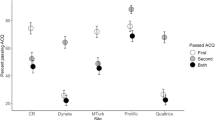Abstract
Some peer punishment technologies may bias experimental results in unwanted ways. A critical parameter to consider in the design is the “fine-to-fee” ratio, which measures the income reduction for the targeted subject relative to the cost for the subject who requested the punishment. We show that a punishment technology commonly used in experiments embeds a variable fine-to-fee ratio and show that it could confound the empirical findings about why, whom, and how much subjects punish.
Similar content being viewed by others
References
Andreoni, J., Harbaugh, W., and Vesterlund, L. (2003). “The Carrot or the Stick: Rewards, Punishment and Cooperation.” American Economic Review 93(3), 893–902.
Bochet, O., Page, T., and Putterman, L. (2002). “Communication and Punishment in Voluntary Contribution Experiments.” Brown University, Department of Economics, Working Papers no. 2002-29.
Bowles, S., Carpenter, J., and Herbert G. (2001). “Mutual Monitoring in Teams: The Effects of Residual Claimancy and Reciprocity.” Working Paper.
Carpenter, J. (2002a). “The Demand for Punishment.” Working Paper 0243, Middlebury College, Department of Economics.
Carpenter, J. (2002b). “Punishing Free-Riders: How Group Size Affects Mutual Monitoring and the Provision of Public Goods.” Working Paper, Middlebury College.
Casari, M. and Plott, C.R. (2003). “Decentralized Management of Common Property Resources: Experiments with Centuries-Old Institutions.” Journal of Economic Behavior and Organization 51(2), 217–247.
Falkinger, J., Fehr, E., Gächter, S., and Winter-Ebmer, R. (2000). “A Simple Mechanism for the Efficient Provision of Public Goods: Experimental Evidence.” American Economic Review 90, 247–264.
Fehr, E. and Gächter, S. (2000). “Cooperation and Punishment in Public Goods Experiments.” American Economic Review 90(4), 980–994.
Fehr, E. and Gaechter, S. (2002). “Altruistic Punishment in Humans.” Nature. 415, 137–140.
Masclet, D., Noussair, C., Tucker, S., and Villeval, M.-C. (2003). “Monetary and Nonmonetary Punishment in the Voluntary Contribution Mechanism.” American Economic Review. 93(1), 366–380.
Nikiforakis, N.S. (2004). “Punishment and Counter-Punishment in Public Goods Games: Can We Still Govern Ourselves?.” March, University of London, Royal Holloway, Department of Economics, Working Paper.
Ostrom, E., Walker, J., and Gardner, R. (1992). “Covenants With and Without a Sword: Self-Governance is Possible.” American Political Science Review 86, 404–417.
Page, T., Putterman, L., and Unel, B. (2002). “Voluntary Association in Public Goods Experiments: Reciprocity, Mimicry and Efficiency.” Brown University, Department of Economics, Working Papers no. 2002-19.
Putterman, L. and Anderson, C.M. (2003). “Do Non-strategic Sanctions Obey the Law of Demand? The Demand for Punishment in the Voluntary Contribution Mechanism.” Brown University, Department of Economics, Working Papers no. 2003-15.
Sefton, M., Shupp, R., and Walker, J. (2002). “The Effect of Rewards and Sanctions in Provision of Public Goods.” CEDEX Working Paper no. 2002-2.
Author information
Authors and Affiliations
Corresponding author
Additional information
JEL Classification: C91, C92
Rights and permissions
About this article
Cite this article
Casari, M. On the Design of Peer Punishment Experiments. Exp Econ 8, 107–115 (2005). https://doi.org/10.1007/s10683-005-0869-9
Received:
Revised:
Accepted:
Issue Date:
DOI: https://doi.org/10.1007/s10683-005-0869-9




